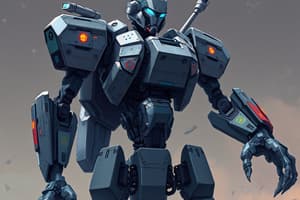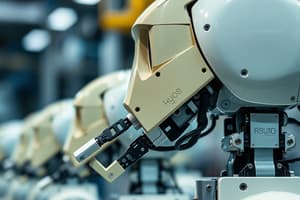Podcast
Questions and Answers
Which of the following are examples of Stationary Robots?
Which of the following are examples of Stationary Robots?
- CNC machines (correct)
- Autonomous vehicles
- Security drones
- Robotic arms (correct)
Besides wheeled robots, what other types of mobile robots exist?
Besides wheeled robots, what other types of mobile robots exist?
- Legged Robots
- Tracked Robots
- Aerial Robots
- Underwater Robots
- Swarm Robots
- All of the above (correct)
What is the primary purpose of industrial robots?
What is the primary purpose of industrial robots?
Automation in manufacturing, assembly, and packaging
Which type of robot is specifically designed to work alongside humans?
Which type of robot is specifically designed to work alongside humans?
What is the primary power source for most modern industrial robots?
What is the primary power source for most modern industrial robots?
Hydraulic robots are typically used for heavy-duty applications.
Hydraulic robots are typically used for heavy-duty applications.
Pneumatic robots are always known for their low power output and lightweight design.
Pneumatic robots are always known for their low power output and lightweight design.
Which of these is an example of an Animal-Inspired Robot?
Which of these is an example of an Animal-Inspired Robot?
Which of these is NOT a type of robot based on the degree of interaction?
Which of these is NOT a type of robot based on the degree of interaction?
What is the primary purpose of Research Robots?
What is the primary purpose of Research Robots?
Military robots are only used for combat operations.
Military robots are only used for combat operations.
Which type of robot performs household tasks?
Which type of robot performs household tasks?
Which of the following is an example of a Humanoid Robot?
Which of the following is an example of a Humanoid Robot?
Flashcards
Mobile Robots
Mobile Robots
Robots that can move around independently, ranging from wheeled platforms to flying drones.
Service Robots
Service Robots
Robots that perform tasks for humans in various settings, like cleaning, security, and healthcare.
Industrial Robots
Industrial Robots
Robots used in manufacturing and assembly lines, often designed for repetitive tasks.
Exploration Robots
Exploration Robots
Signup and view all the flashcards
Medical Robots
Medical Robots
Signup and view all the flashcards
Military Robots
Military Robots
Signup and view all the flashcards
Humanoid Robots
Humanoid Robots
Signup and view all the flashcards
Autonomous Robots
Autonomous Robots
Signup and view all the flashcards
Human-Controlled Robots
Human-Controlled Robots
Signup and view all the flashcards
Collaborative Robots (Cobots)
Collaborative Robots (Cobots)
Signup and view all the flashcards
Wheeled Robots
Wheeled Robots
Signup and view all the flashcards
Legged Robots
Legged Robots
Signup and view all the flashcards
Tracked Robots
Tracked Robots
Signup and view all the flashcards
Aerial Robots
Aerial Robots
Signup and view all the flashcards
Underwater Robots
Underwater Robots
Signup and view all the flashcards
Swarm Robots
Swarm Robots
Signup and view all the flashcards
Animal-Inspired Robots
Animal-Inspired Robots
Signup and view all the flashcards
Modular Robots
Modular Robots
Signup and view all the flashcards
Soft Robots
Soft Robots
Signup and view all the flashcards
Electric Robots
Electric Robots
Signup and view all the flashcards
Hydraulic Robots
Hydraulic Robots
Signup and view all the flashcards
Pneumatic Robots
Pneumatic Robots
Signup and view all the flashcards
Stationary Robots
Stationary Robots
Signup and view all the flashcards
Semi-Autonomous Robots
Semi-Autonomous Robots
Signup and view all the flashcards
Entertainment Robots
Entertainment Robots
Signup and view all the flashcards
Domestic Robots
Domestic Robots
Signup and view all the flashcards
Research Robots
Research Robots
Signup and view all the flashcards
Independent Robots
Independent Robots
Signup and view all the flashcards
Study Notes
Robot Classification by Mobility
- Stationary Robots: Fixed in one location, typically used in manufacturing and assembly. Examples include robotic arms and CNC machines.
- Mobile Robots: Capable of movement, categorized further into:
- Wheeled Robots: Employ wheels for movement. Examples include autonomous vehicles and warehouse robots.
- Legged Robots: Use legs for locomotion. Examples are humanoid robots and quadrupeds like Boston Dynamics' Spot.
- Tracked Robots: Use continuous tracks for movement. Examples include military reconnaissance robots.
- Aerial Robots: Utilize propellers or wings for flight. Examples include drones and UAVs.
- Underwater Robots: Designed for operations underwater. Examples include remotely operated vehicles (ROVs).
- Swarm Robots: Multiple small robots working together. Examples include microbots used in research.
Robot Classification by Application
- Industrial Robots: Used for automation in manufacturing, assembly, and packaging. Examples include welding robots and painting robots.
- Service Robots: Perform tasks for humans, such as cleaning, security, or healthcare. Examples include Roomba (cleaning), security drones, and robotic nurses.
- Medical Robots: Assist in surgeries, diagnostics, or therapy. Examples include the Da Vinci Surgical System and rehabilitation robots.
- Exploration Robots: Designed for exploration in extreme environments. Examples include Mars rovers and underwater exploration robots.
Robot Classification by Military Use
- Military Robots: Used for defense, surveillance, or combat. Examples include bomb disposal robots and drones.
Robot Classification by Entertainment Use
- Entertainment Robots: Used in amusement and media industries. Examples include animatronics and robotic pets.
Robot Classification by Domestic Use
- Domestic Robots: Perform household tasks. Examples include cleaning robots and robotic assistants.
Robot Classification by Research Use
- Research Robots: Built for experimental and educational purposes. Examples include humanoids like ASIMO and robots for AI research.
Robot Classification by Control System
- Autonomous Robots: Operate without human intervention, using sensors and algorithms. Examples include self-driving cars and robotic vacuum cleaners.
- Semi-Autonomous Robots: Require some human input for operation. Examples include teleoperated drones.
- Human-Controlled Robots: Fully controlled by a human operator. Examples include remote-controlled robots.
Robot Classification by Shape and Design
- Humanoid Robots: Mimic human form and behavior. Examples include ASIMO and Sophia.
- Animal-Inspired Robots: Mimic animals in design and movement. Examples include robotic snakes and robotic dogs.
- Modular Robots: Composed of multiple modules for flexibility. Examples include self-reconfigurable robots.
- Soft Robots: Made with flexible materials, suitable for delicate tasks. Examples include gripping robots for fragile objects.
Robot Classification by Degree of Interaction
- Collaborative Robots (Cobots): Designed to work alongside humans safely. Examples include cobots from Universal Robots.
- Independent Robots: Operate independently without human interaction. Examples include warehouse robots used in logistics.
Robot Classification by Power Source
- Electric Robots: Powered by electricity. Most modern industrial robots are examples.
- Hydraulic Robots: Use hydraulic systems for movement. Examples include heavy-duty robotic arms.
- Pneumatic Robots: Use compressed air for motion. Examples include lightweight robotic arms.
Studying That Suits You
Use AI to generate personalized quizzes and flashcards to suit your learning preferences.



